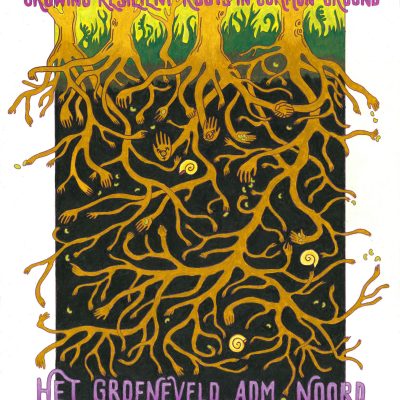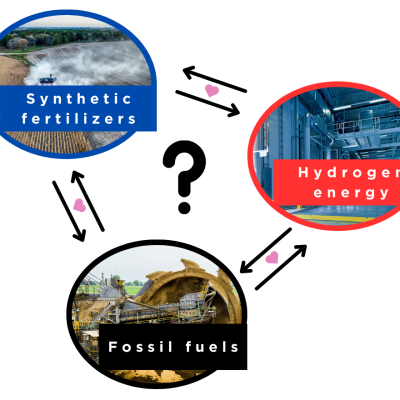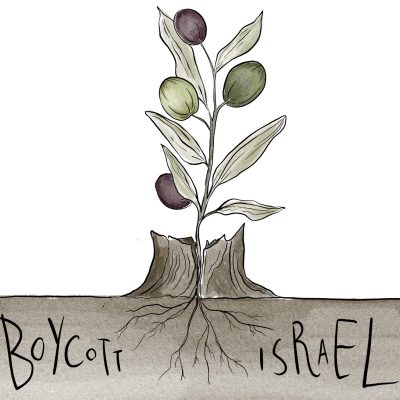Synthetic nitrogen fertilizer giant Yara International has published a paper detailing “Our Position on Regenerative Agriculture” as a part of a larger marketing campaign to greenwash their destructive, neo-colonial and exploitative practices. In the position paper, Yara attempts (and fails) to combine their promotion of chemical and fossil fuel-intensive, controlled precision agriculture with the holistic principles of regenerative agriculture. They force together elements of both narratives resulting in a vague, confusing mess of contradicting statements, hollow promises and corporate buzzwords. Yara’s position is contradictory, not only contradictory to their actions’ material consequences on soil, ecosystems, and farmers and food workers, but also contradictory to statements that they themselves make in the same position paper.
Below we have compiled and debunked some of Yara’s most problematic statements and nonsensical lies about their version of “regenerative” agriculture in their position paper.
Greenwashing appears in this paper in two main ways: as generally misleading statements that bend reality, Yara’s role, and leave their agenda and ideology thinly veiled—and outright lies. This first section contains many outright false statements that obscure the actual effects of Yara’s business model and synthetic nitrogen fertilizers, as they list the many “benefits” of their de-generative practices that rely entirely on chemical fertilizers.
“If regenerative farms manage their agricultural soil through balanced crop nutrition and fertilization practices adapted to local conditions, there are several positive outcomes.”
Here it’s important to notice how they sneak in the term “balanced crop nutrition and fertilization practices”, making it sound like natural practices that fit into the holistic and place-based framework of regenerative agriculture—but make no mistake! They are still advocating for fossil fuel-dependent synthetic nitrogen fertilizers, and what follows are the so-called benefits of the use hereof:
- “Increased agricultural output optimizing land use efficiency and ensuring food security.” It is a widespread myth that chemical input leads to greater crop yield necessary to “feed the world”. In reality, crop yield increases after introducing chemicals to the soil, but hereafter it decreases drastically, leaving the soil addicted to the continuous chemical input. The only thing that chemical-dependent industrial agriculture does with “efficiency” is generate income for big agribusiness!
- “Increased crop resilience to climate stress thanks to improved nutrient availability in the soil and better crop quality.” Monoculture significantly decreases crop resilience and leaves agricultural lands more vulnerable to droughts and floods, as it loses its water retention ability. In addition, conventionally grown food contains far fewer nutrients than that from naturally regenerating soil organic matter, microorganisms and minerals. It is also very worth pointing out the irony that an agrochemical company that greatly contributes to climate change promises products that help mitigate against the damage from said climate change (see two points below about carbon footprints)!
- “Improved soil fertility and soil health through improved plant growth, more organic matter is recycled into the field, improving soil structure, nutrient supply to soil micro-organisms, and soil organic carbon content and sequestration.” Again, this is simply not true. Synthetic nitrogen fertilizer replaces and kills off all elements of the soil ecosystem, depleting it and creating a dependence on continuous chemical input. Less organic matter is recycled into the fields, not more, and dead soil cannot sustain itself. It cannot grow plants, retain water, or sequester carbon. Inter-cropping or cover-cropping with nitrogen-fixing legumes, on the other hand, provides a way to naturally feed nitrogen into the soil. To better understand how synthetic nitrogen fertilizers are detrimental to soil health, quality of food, and local ecosystems, read ASEED’s FAQ on nitrogen fertilizer.
- “Reduced carbon footprint as optimizing nutrient management increases yields reduces in-field emissions per unit of crop produced, and a higher nutrient availability leads to lower nutrient losses.” Yara is one of the biggest producers of synthetic nitrogen fertilizers in the world. Synthetic nitrogen fertilizers contribute to more than 20% of greenhouse gas emissions in the agricultural sector and is entirely dependent on fossil gas. Yara is Europe’s biggest corporate buyer of fossil gas and has spent €11.8bn on corporate lobbying in the EU from 2011-19. Yara is not interested in lowering their emissions, they are interested in maintaining goodwill and protecting their profits.
- “Reduced stress on freshwater reserves as well nourished plants increase water use efficiency and provide more shadow cover to the soil, and efficient nutrient management reduces leaching.” As only 30-50% of applied synthetic nitrogen fertilizer is retained by crops, predominantly due to leaching (nutrient runoff from soil into water), it’s very safe to assume that the use this chemical does not lead to “reduced stress on freshwater reserves”. Nitrogen runoff is very harmful to local biodiversity and can in worst cases lead to dead zones in bodies of water, where excess nutrients generate algae blooms that kill off all other life.
- “Reduced pressure towards land use change, deforestation and biodiversity loss in nearby zones, given local structural and political support, due to higher productivity from existing agricultural land.” Numerous studies have shown that industrial agriculture is not, in fact, more productive than for instance agroecological farming. Dependence on chemical input that requires fossil fuels for production will certainly only increase land use change, deforestation and biodiversity loss (remember leaching?).
- “Improved human health as the mineral nutrition applied to grow agricultural crops and pastures strongly affects the nutritional quality of food as well as biodiversity, both of which are essential to human well-being.” Yes, the “mineral nutrition applied to grow agricultural crops” does affect the “nutritional quality of food”, but negatively. As mentioned in sections above, synthetic nitrogen fertilizer destroys the soil’s ability to replenish its own minerals and nutrients and leads to nutrient-poor food.
The following segment tackles Yara’s vague, misleading language as well as their own incoherent definition of regenerative agriculture. It highlights that these inconsistencies, lies and misrepresentations are purposeful, intended to hide the incompatibility of global industrial polluters like Yara with the principles of regenerative agriculture.
“Yara supports the implementation of regenerative agriculture according to our definition of it as a “systematic, outcome-based approach to adopt the best sustainable farming practices that positively affect nature and climate, across five recurrent themes: climate, soil health, resource use efficiency, biodiversity, and prosperity.”
True regenerative agriculture is inherently holistic and seeks to mimic the dynamics of local ecosystems, rather than being designed to reach quantitatively measurable outcome targets. This is in stark contrast to Yara’s one-size-fits-all approach, as they try to mass-implement what they consider “the best sustainable farming practices”, explicitly stating that they only support practices that align with their own definition. Agrochemical companies such as Yara strive to control every aspect of nature to maximise yields and increase profits for themselves (not the farmers)—what they consider “prosperity”. Yara takes advantage of the undefined nature of the regenerative agriculture concept to legitimize their own practices under this umbrella.
“International agreements and scientific studies on climate and nature lay the foundations for a shift to regenerative agriculture.” […] “Yara is committed to work alongside other frontrunners to achieve common goals.”
In the very first sentence of the position paper, Yara announces “international agreements and scientific studies” as the core of the regenerative agriculture movement. Yara places the credit for a very wide range of context-based, diverse farming practices developed over millenia by peasant and Majority World farmers and food workers onto recent, governmental and corporate institutions. This reinforces their own claim on influencing agriculture today. The deliberately vague “scientific” community that Yara presents as a single, absolute authority allows them to control the narrative, while in reality cherry-picking the research that aligns with their values and agenda. More often than not, the scientists and think tanks Yara consult are funded and controlled by agribusinesses with vested interest in producing business-as-usual “universal truths” through biased research results This narrative creates a clear hierarchy of knowledge, where Yara places themselves at the top “alongside other frontrunners” and sees it as their task to “help” farmers.
“There is ongoing work to agree on common quantifiable metrics so that all value chain players can support and finance the transition. Yara is actively participating, with our crop nutrition knowledge, in co-development of the framework.”
Yara’s participation in (re)defining regenerative agriculture and “growing the future of farming” reads like a humble offering of their “skillset”. In reality “agree[ing] on common quantifiable metrics“ means imposing top-down legislation, controlled by the lobbying interests of Yara and other agrochemical corporations and actively reducing the agency of marginalised farmers. Yara is participating in these discourses to preserve their own influence on agriculture, and they assume an enormous position of power.
“Regenerative agriculture is broader and less prescriptive than other approaches, methods and terms used for much of the same purposes, such as agroecology, and organic, conservation, precision and carbon farming. It is more inclusive to all farmers and practices that lead to regenerative outcomes, including a targeted and optimized use of mineral fertilizers.”
Yara uses the diverse nature of regenerative agricultural practices to squeeze in their own products: synthetic nitrogen fertilizers (which they here call “mineral fertilizers”). They find space for themselves in the regenerative agriculture movement in the name of inclusivity, but let’s clear this up once and for all: dependence on continuous chemical input is not regenerative! It opposes the very meaning of regeneration: namely that the soil is able to sustain its own health and nutrition to grow plants – without chemical tampering.
“Balanced and precise crop nutrition, whether from organic or mineral sources, is essential in scaling up regenerative agriculture while maintaining regional and global food security.”
This is one of the more blatant lies. There are multiple issues here:
- Removed from it’s context, this sentence seems almost self-evident. Yes, crops require balanced nutrition. And, yes, we need much more conventional agriculture to make the change to regenerative agriculture. This paper’s context, however, gives these statements another meaning “Balanced and precise crop nutrition“ can be read as a direct stand-in for “Yara International“, as they believe their product “help[s] farmers […] transition into regenerative farming“.
- In realizing that synthetic fertilizers deplete the soil, create high emissions, and pollute local environments, Yara is trying to place the blame onto the farmers who use these chemicals, claiming that the issue is not the product itself, but rather misuse and especially overuse of chemical fertilizers. You can read more about Yara’s “climate-smart approach to nutrient management” on their page on digital farming and compare it to criticisms of so-called climate smart agriculture here and here.
- Equating fertilizers from “organic or mineral [read: chemical!] sources” is wildly misleading as the two are incomparable in terms of methods of production, application and long-term effects. Learn more here, here, and here.
- Here, “Scaling up“ simply means expansion of Yara’s client base, while also directly contradicting how Yara frames regenerative agriculture, as “every region and every farm is unique, [and] how to get there (…) is left to each farmer to adapt based on (…) the specific context.”
“Yara strongly supports the notion that farmers themselves are at the core of the transformation to regenerative farming.”
The first sentence of the position paper would seem to strongly contradict this statement. Farmers and food workers should indeed be the core of the transformation towards more just and sustainable food systems, and Yara has no place inserting themselves into this process. For farmers to truly have agency over their food practices, we need collective food autonomy for both growers and eaters, and this means abolishing the hegemony of Global North agribusiness. Yara, just like the rest of the fossil fertilizer cartel, has a long history of trapping farmers (especially in the Global South through the Green Revolution agenda) into synthetic fertilizer dependence and debt and has specifically used crises such as the Covid-19 pandemic as an opportunity to expand their supply chains and reach previously inaccessible markets. Through the initiative Action Africa: Thriving Farms, Thriving Future, Yara distributed “40,000 tons of premium fertilizer” in East Africa, making their soils’ fertility dependent on Yara’s poisonous products. Pretending to “help” vulnerable farmers in the Global South for goodwill in the Global North, while using a crisis as an opportunity for violent market expansion highlights Yara’s predatory nature and how they further entrench neo-colonial power structures to trap farmers.
ASEED has previously reacted to this kind of co-optation of regenerative agriculture, particularly at last year’s “Regenerative Agriculture & Food Systems Summit”, where big agribusiness gathered to re-frame the regenerative agriculture narrative in their favour. This de-generative agriculture summit will take place again this year, and ASEED will be present at alternative grassroots gatherings in collaboration with other movements to shed light on what true regenerative agriculture entails, how we can fight these corporate powers and take back control of our food systems together. Stay tuned for more info to come!
For more tools to see through agribusiness’ lies and deceit, we highly recommend GRAIN’s article “An agribusiness greenwashing glossary”! Read it to learn more about false solutions such as net zero, carbon offsets, nature-based solutions, zero deforestation, climate smart agriculture, agriculture 4.0, regenerative agriculture(!), carbon farming, bioeconomy, and green finance.








